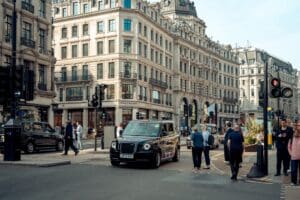Retail leaders are calling on Chancellor Rachel Reeves to scrap the so-called “tourist tax,” warning that Britain is losing billions in economic growth as tourists opt to shop elsewhere in Europe
In a letter signed by more than 300 chief executives, including leaders from John Lewis, British Airways, Fortnum & Mason, and the Royal Opera House, Reeves is urged to reintroduce VAT-free shopping for overseas visitors in her upcoming Budget.
The signatories, which also include high-profile figures such as hotelier Sir Rocco Forte, fashion designers Sir Paul Smith and Anya Hindmarch, argue that the removal of tax-free shopping has left the UK at a “massive global disadvantage.”
The letter states: “What has become known as the ‘tourist tax’ has turned into a spectacular own goal for the UK. The UK is now the only country in Europe that does not offer tax-free shopping to tourists, leaving British businesses at a massive global disadvantage. This does not just affect a few luxury stores in London’s West End… The entire tourist economy is affected.”
Brexit and the tourist tax
The tourist tax refers to the end of VAT-free shopping for tourists, a policy scrapped by then-chancellor Rishi Sunak in the wake of Brexit. The Treasury has maintained that reinstating the scheme would cost up to £2 billion annually in lost tax revenue. However, retailers argue that this assessment is flawed and overlooks the broader economic benefits of encouraging tourism.
Research by the Centre for Economics and Business Research (Cebr) suggests the decision is costing the UK £11.1 billion in lost GDP each year and is deterring 2 million tourists annually. The letter stresses that tourists are increasingly choosing to visit cities like Paris, Milan, and Berlin where VAT rebates are still available, rather than shopping in the UK.
Brian Duffy, CEO of the Watches of Switzerland Group, highlighted the potential economic benefits of reintroducing VAT-free shopping: “The new Labour Government says that growth is its priority. Bringing the UK in line with other countries and removing the tourist tax would make an immediate positive impact on UK economic growth.”
Treasury review and ongoing debate
Earlier this year, former chancellor Jeremy Hunt ordered the Office for Budget Responsibility (OBR) to review the impact of the tourist tax. Despite the retail sector’s concerns, the OBR maintained that the Treasury’s initial calculations, which concluded that the tourist tax would not significantly impact the economy, were accurate. The OBR noted that reinstating VAT-free shopping would be unlikely to increase the UK’s productive capacity.
Nevertheless, retail bosses are calling for a new assessment. The letter to Reeves asks for “decisive action” and a fresh, objective review of the issue to address the financial harm the tourist tax is allegedly causing.
Economic impact and industry pressure
Retailers argue that the tourist tax is not just a burden on luxury brands in London’s West End but impacts the entire hospitality and retail sectors across the UK. The tax discourages international visitors from spending in Britain, hurting businesses nationwide that depend on tourism revenue.
The government’s resistance to restoring the tax-free shopping scheme has left many in the retail sector frustrated, with industry leaders warning that British businesses are being forced to compete on an uneven playing field. Sir Rocco Forte and other signatories insist that reintroducing VAT-free shopping would not only align the UK with other European countries but also boost tourism, generate additional revenue, and support economic growth.
The Treasury has yet to respond to these latest calls, but as Rachel Reeves prepares to deliver her maiden Budget, pressure is mounting from retail leaders who argue that scrapping the tourist tax could provide a much-needed boost to the UK’s post-Brexit economy.
Read more:
UK at ‘massive global disadvantage’ over tourist tax, retail bosses warn Rachel Reeves







